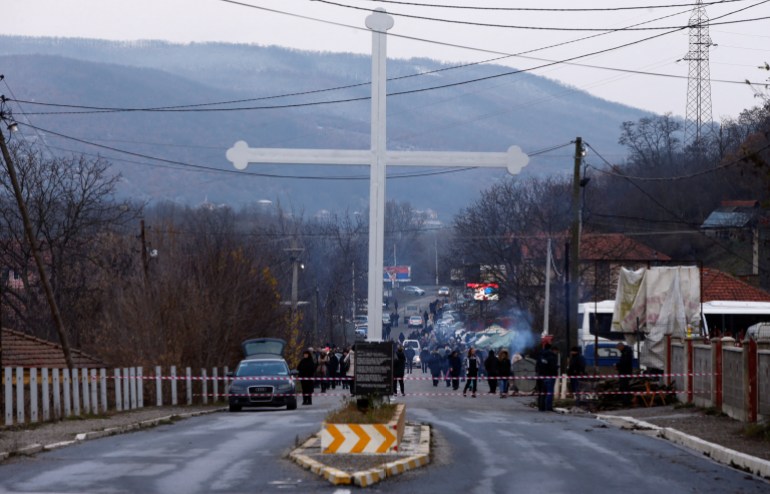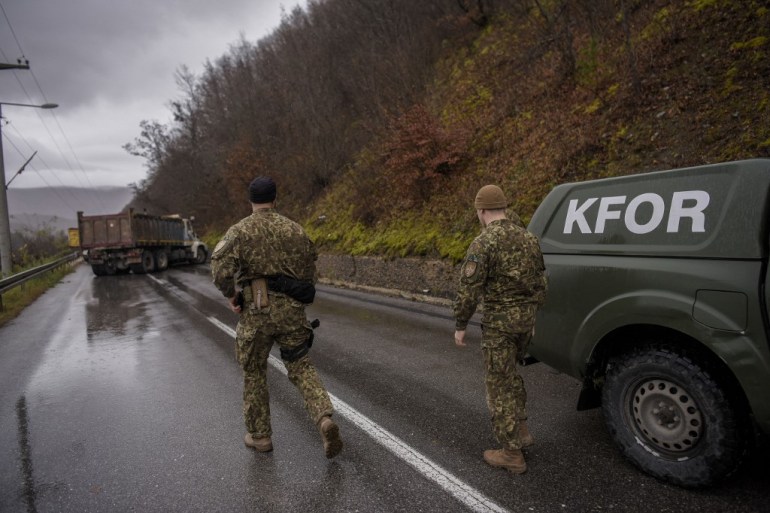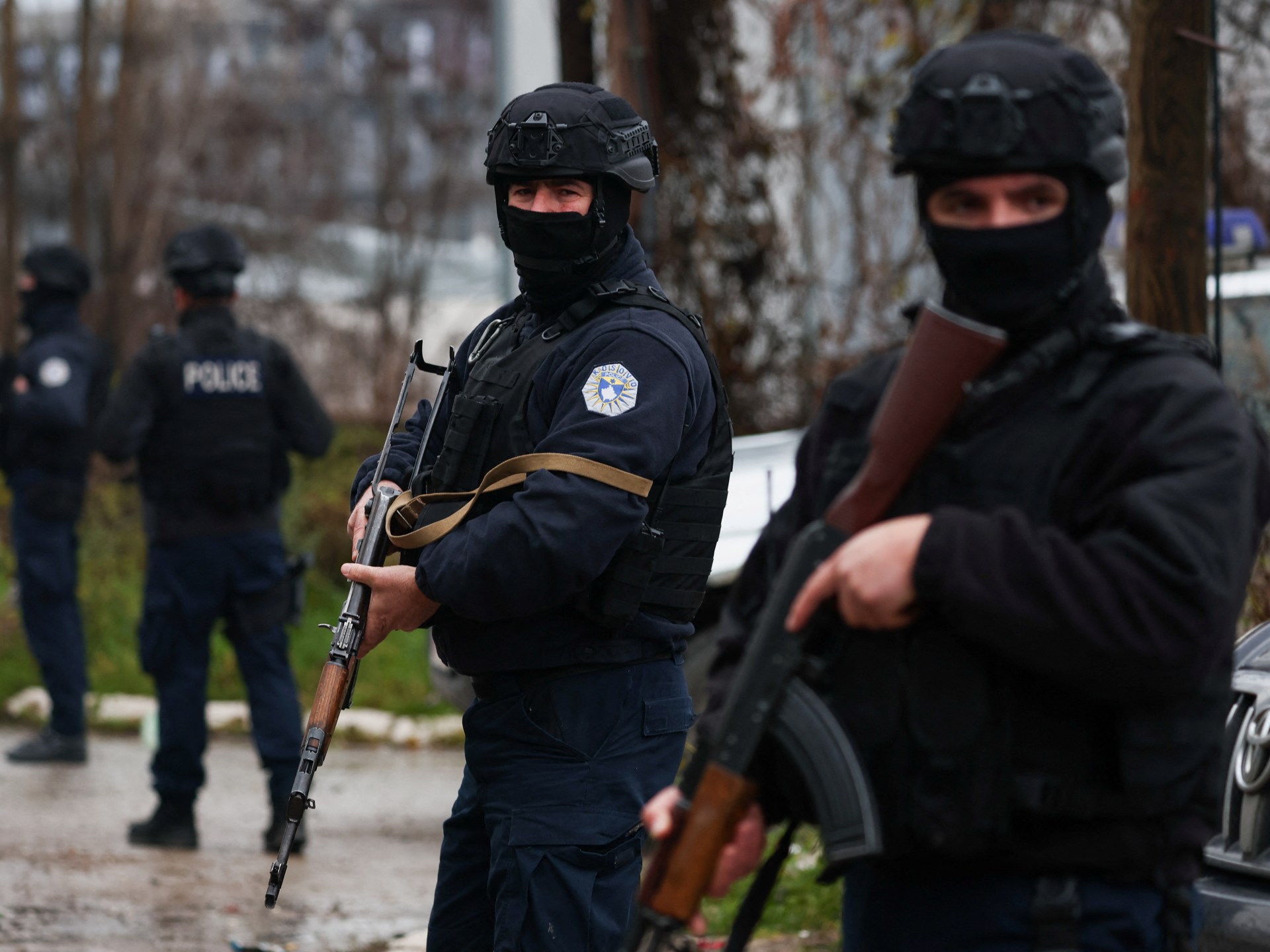Tensions in north Kosovo – whose agenda does the flare-up serve?
Tensions in Serb-populated northern Kosovo – a flashpoint in the Western Balkans for decades – have risen in recent weeks.
On December 10, a stun grenade was thrown at a reconnaissance patrol from the European Union’s rule of law mission in Kosovo.
There have also been exchanges of fire between the local police and unknown groups.
The EU has warned that failure to resolve such friction risks bringing Serbia and Kosovo back to their violent past.
Many ethnic Serbs in northern Kosovo are angry about the arrest of a former Serb policeman accused of playing a role in attacks against Kosovo police.
He was one of about 600 Kosovo Serbs who resigned from the police force last month in protest of Pristina, declaring that members of Kosovo’s Serb minority would need to exchange Serbian licence tags predating the war with Republic of Kosovo ones.
Although now resolved through a Brussels-brokered deal, this year’s bureaucratic dispute over licence plates heightened tensions between the Pristina government on one side and both Kosovo Serbs and Belgrade on the other.

The deployment of ethnic Albanian police to northern Kosovo amid unrest resulting from that dispute drove many Kosovo Serbs to establish roadblocks in North Mitrovica.
The scheduling of local elections in four northern municipalities for this month has exacerbated friction, too.
Kosovo’s dominant Serb political party decided to boycott them. On December 10, Kosovo’s President Vjosa Osmani announced the postponement of these elections until April 2023 – a move welcomed by Western governments, which call for these roadblocks to be taken down immediately.
According to Igor Novakovic, the research director of the International and Security Affairs Centre – ISAC Fund, significant amounts of tension in northern Kosovo stem from Pristina’s failure to maintain its commitments under the historic April 2013 Brussels-brokered pact, which was an important step towards normalising Belgrade-Pristina relations.
The agreement required Serbia to agree to cooperating with Kosovo in ways that would basically permit the former Serbian province to function like a sovereign nation-state, albeit without Belgrade needing to recognise its independence.
The pact also stipulated that Kosovo Serbs must have representation while giving Serbia a path towards EU membership.
Serbian troops
Citing United Nations Resolution 1244 (PDF), officials in Belgrade warned that Serbia might send up to 1,000 security forces to their “homeland” in northern Kosovo.
President Aleksandar Vucic said that he would ask for NATO’s permission for this deployment as part of an effort to defuse tension in Kosovo’s restive north.
Yet, Vucic acknowledges the low probability of the NATO-led international peacekeeping force (KFOR) granting such permission.
Meanwhile, Kosovo’s Prime Minister Albin Kurti on Monday called for KFOR’s intervention to prevent “criminal gangs” from denying “freedom of movement” amid these roadblocks.
Talk of deploying Serbian security forces is “deeply worrisome and does risk of course the outbreak of serious violence”, Matthew Bryza, the former United States ambassador to Azerbaijan, told Al Jazeera.
“I am sure that the President of Serbia will keep [KFOR’s presence] in mind as he considers what sort of military steps – as unwise as they would be – he may be contemplating in northern Kosovo.”
KFOR peacekeepers have played a critical role in maintaining the peace between Pristina and Belgrade, as well as Kosovo’s government and the country’s Serb minority, which makes up six percent of Kosovo’s population.
Belgrade has depended on these 4,000 NATO troops to protect Kosovo’s Serb minority while Pristina relies on KFOR to prevent Serbian forces from entering Kosovo.
The leadership in Belgrade understands that any conflict with KFOR would not end well for Serbia.

“I don’t see a full blown-out armed conflict between Kosovo and Serbia for a very simple reason, NATO,” Engjellushe Morina, a senior policy fellow at the European Council on Foreign Relations, told Al Jazeera.
But she did predict “incidents in the days and weeks to come” amid this tense situation.
Vucic’s warning is “just for show and escalation without a real threat”, assesses Florian Bieber, the coordinator of the Balkans in Europe Policy Advisory Group and the Jean-Monnet chair in the Europeanisation of Southeastern Europe at the University of Graz, Austria.
“There is a lot of warmongering rhetoric, but it is mostly a performance. After all, the NATO-led peacekeepers in Kosovo are not going to allow a Serbian intervention and thus, the risk of war is very low.”
Ukraine factor
The Russian invasion of Ukraine has aggravated fractures in the Western Balkans and deepened the Belgrade-Pristina divide.
“The Ukraine war has demonstrated the difficulty of constructing a democratic, multiethnic federal state, especially one with an irredentist neighbour that continues to eye territory of that new state,” John Feffer, the director of Foreign Policy in Focus, told Al Jazeera.
“Ethnic Serbs in Kosovo know that they have an uncertain status in a country that has not been universally recognised. So, much is up in the air.”
Belgrade and Pristina’s decades-long negotiations and US and EU-led efforts to persuade Serbia to recognise Kosovo’s independence in exchange for EU membership have been “put in doubt because of the aggressiveness of ethnic Serbs that has grown since Russia invaded Ukraine, with of course Russia being the strongest friend of the Serbian population”, according to Bryza.
“This attitude of agitation obviously was always there in northern Kosovo.”
The former US ambassador explained that actions taken by Republika Srpska’s President Milorad Dodik such as military parades reflect such aggression on the part of Moscow-backed Serb politicians in the Western Balkans.
Fearful of Russia’s clout in the Western Balkans in the post-February 24 period, Kosovo is more determined to gain NATO membership.
Earlier this year, Osmani accused the Kremlin of having a “destructive interest in our region” which includes “attacking Kosovo, Bosnia and Herzegovina, and to some extent also Montenegro”.
Yet, four NATO members – Greece, Romania, Slovakia, and Spain – not recognising Kosovo’s independence makes the idea of the country joining the transatlantic alliance impractical, at least for now.

Amid the Ukraine war, Europe’s new environment has given Pristina an opportunity to help bring more Western attention to the Belgrade-Moscow relationship, depicting Serbia as Russia’s proxy.
Yet, Novakovic told Al Jazeera that “the situation in the region is much more complicated than a black-and-white picture and the fact that Serbia did not introduce sanctions toward Russia does not necessarily mean that Serbia is Russia’s ally per se”.
Despite frequently pandering to pro-Putin constituents in Serbia, Vucic has not been pleased with Russian aggression towards Ukraine.
“Although Serbia hasn’t imposed sanctions, it also didn’t recognise the breakaway regions, and Vucic was unhappy with Putin’s explicit use of Kosovo as a precedent to justify the independent status of the Donbas,” explained Feffer.
“Serbia is also dependent on EU assistance, so that serves as a serious brake on any steps Belgrade takes toward Kosovo.”
Moscow’s agenda
Even without a revival of the 1998-99 Kosovo War, the continuing tensions serve Moscow’s agenda of capitalising on political, social and ethnic fractures in the Western Balkans to create trouble for Brussels and Washington.
“I am sure that the Russians are very happy and encouraging Serbia to take the stance that it is at the moment because clearly it is in its interests to try and make trouble in another part of the continent and distract Western attention from Ukraine,” Tim Judah, a special correspondent for The Economist magazine, told Al Jazeera.
“But this issue and the frequent flare-ups of tension long predate the Ukraine war so there is no reason to assume what we have seen recently would not be happening regardless.
“The only difference is that Ukraine has given an added impetus to the EU and US to try and resolve the Serbia-Kosovo issue, which is why we have seen so much diplomatic activity over the last few months.”




